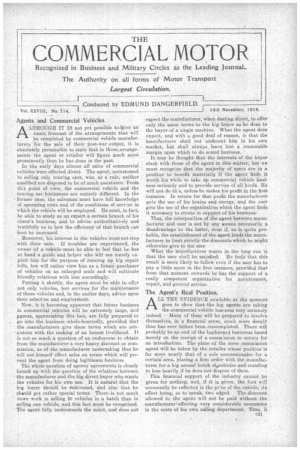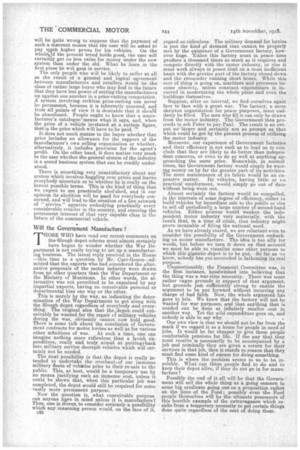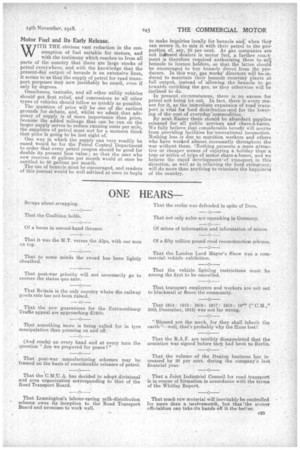Agents and Commercial Vehicles.
Page 1

Page 2

Page 3

If you've noticed an error in this article please click here to report it so we can fix it.
ALTHOUGH IT IS not yet possible to give an • exact forecast of the arrangements that will be completed by commercial vehicle manufacturers for the sale of their post-war output, it. is absolutely permissible to state that in those. arrangemeats the agent or retailer will figure much more prominently than he has done in.the past.
In the early days almost all sales of commercial vehicles were effected direct. The agent, accustomed . to selling only touring ears, was, aS a rule, neither qualified nor disposed to be of much assistance: From this point of view, the commercial vehicle and the touring car blisin.esses are entirely different. In the former ease, the salesman must have full knowledge of operating costs and of the conditions of service in which the vehicle will be employed. He must, in fact, be able to study as an expert a certain branch of his client's business, and to advise authoritatively and truthfully as to how the efficiency of that branch can best be increased.
Moreover, his interest. in the vehicles Must not stop with their sale. If troubles are experienced, the owner of a vehicle must be able to feel that he has at hand a guide and helper who will not merely exploit him for the purpose of running up big repair bills, but will rather view him as a future purchaser of vehicles on an enlarged scale and will cultivate friendly relations with him accordingly.
Putting it shortly, the agent must be able to offer not only vehicles, but services for the maintenance Of those vehicles and, in the earlier days, advice upon their selection and employinent.
Now, it is becoming apparent that future business in commercial vehicles will be extremely large, and kgents, appreciating this fact, are fully prepared to go into the business whole-heartedly, provided that the .manufacturers give them terms which are consistent with the making of an honest livelihood. It is not so much. a question of an endeavour to obtain from the manufacturer a very heavy discount or commission, as of the manufacturer undertaking that he will not himself effect sales on terms which will prevent the agent from doing legitimate business.
The whole question of agency agreements is closely bound up with the question of the relations between the manufacturer and the big direct buyer who wants the vehicles for his own use. It is natural that the big buyer s.houid be Cultivated, and aho that he should get rather special terms. There is not much more work in selling 20 vehicles in a batch than in selling one vehicle, and this fact must be recognized. The agent hilly understands the point, and does not expect the manufacturer, when dealing direct, to offer only the same terms to the big buyer as he does to the buyer-of a single machine. What the agent does expect, and with a good deal of reason, is that the manufacturer shall not undercut him in his own a market, but shall always leave him reasonable margin upon which to do sound business.
may be thought that the interests of the buyer clash with those of the agent in this mhtter, but we must recognize that the majority, of users are in a 'position to benefit materially if the agent finds it worth his while to take up commercial vehicle business seriously and to provide service of alfkinds. He will not do this, unless he makes his profit in the first instance. In return for that profit the manufacturer gets the use of his brains and energy, and the uSer • gets the use of the organization which the agent finds it necessary to create in support of his business.
Thus, the interposition of the agent between mannfac furor and user is not by any means necessarily, a disadvantage to the latter, even if, as is quite probable, the establishment of the agent leads the manufacturer to limit strictly the discounts which he might otherwise give to the user.
What the manufacturer wants in the long run is that the user shall be satisfied. He feels that this result is more likely to follow even if the-user has to pay a little more in the first instance, provided that hem that moment onwards he has the support of a really competent ' organization for maintenance, . repair, and general service.
The Agent's Real Position. •
ALL THE EVIDENCE available at the moment goes to show that the big agents are taking the commercial vehicle business very Seriously , indeed. Many of 'them will be prepared to involve themselves, in 'a financial sense, much more deeply than has -ever before been contemplated. There will probably be an end of the haphazard businesss based merely on the receipt of a commission in return for an introduction. The place of the mere commission agent 'will be taken by the retailer whose position-is far more nearly that of a sole concessionaire for a certaidarea, placing a firm order with the manufacturer for a big annual batch ofavehicles and standing to lose heavily if he does not dispose of them.
This financial support of the industry cannot be given for nothing, and, if it is given, the fact will necessarily be reflected in the price of the vehicle,its effect being, so to speak, two edged. The discount allowed to the agent will not be paid without the manufacturer' effecting very considerable economies in the costs of his own selling department. Thus, it Will be quite wrong to suppose that the payment of such a discount means that the user will be asked to pay napch higher prices for his vehicles. On the wholeVif the present trend holds good, the user will certainly ,get no less value for money under the new system than under the old. What he loses in the first plaee he will gain in service. The only people who will be likely to suffer at all as the result of a general and logical agreement between manufacturers and retailers, would be the class of rather large buyer who may find in the future that they have less power of setting the manufacturers up against one another in a price-cutting competition. A system involving recklesa price-cutting can never be permanent, because it is inherently unsound, and from all points of view it is desirable that it should be abandoned. People ought to know that a manufacturer's catalogue'means what it says, and, when the price of a vehicle is, stated at a certain figure, that is the price which will have to be paid.
It does not much matter to the buyer whether that price includes an allowance for the support of the manufacturer's own selling organization or whether, alternatively, it includes provision for the agent's profit. On the other hand, it does matter very much to the user whether the general system of the industry is a sound business system that can be readily under stood. .
There is something very unsatisfactory about any system which involves haggling over prices and leaves everybody uncertain as to whether he is really on the lowest possible terms. This is the kind of thing that we expect to see practically abolished, and in our opinion its abolition will be gond for everybody concerned, and will lead to the creation of a fine network of " service " agencies embodying practically every considerable retailer in the country, and ensuring the permanent interest of that very capable class in the future of the commercial vehicle.
Will the Government Manufacture ?
THOSE WHO have read our recent comments on the Slough depot scheme must almost certainly have begun to wonder whether the War Department is not really trying to set up a manufacturing business. The latest reply received in the House —this, time to a question by Mr. Carr-Gomm—admitted that the experts who had considered the alternative proposals of the motor industry were drawn from no other quarters than the War Department or the Ministry of Munitions. In other words, the alternative was not permitted to be examined by any impartial experts, having no conceivable personal or departmental bias one way or the other.
This is merely by the way, as indicating the determination of the War Department to get along with the Slough depot regardless of everybody and everything. The 'original idea that the.depot could conceivably be wanted for the repair cf military vehicles during the war, obviously cannot now hold good. i
There s sonic talk about the conclusion of Government contracts for motor lorries as well as for various other nytinitions of war. . At such a time, one can imagine nothing more ridiculous than a lavish expenditure; really and truly aimed at putting o back into military service decrepit vehicles which will certainly not be needed.
The next possibility is that the depot is really intended to undertake the overhaulaof our immense military fleets of vehicles prior to their re-sale to the public. This, at best, would be a temporary use by no means justifying such an immense cost, unless it could be shown that, when this particular job was completed, the depot would still be required for sonic vastly more permanent purpose.
Now the question is, what conceivable purpose can anyone have in mind unless it is manufacture / Thus, one is driven to consider seriously a possibility which any reasoning person would, on the face of it, regard as ridiculous. The military demand for lorries is just the kind pf demand that cannot be properly met by the existence of a Government factory, however huge. 'Either this factory must in peace time produce a thousand times as much as it requires and compete directly with the motor industry, or else it must work always in peace tim6 on a most inefficient basis with the greater part of the factory closed down and the remainder running short hours. While this sort of thing is going on, machines and processes become obsolete, unless constant expenditure is incurred in modernizing the whole plant and even the buildings themselves.
Suppose, after an interval, we find ourselves again face to face with a great war. The factory, a mere skeleton organization for peace purposes, must suddenly be filled. The men who fill it can only be drawn from the motor industry. The Government then proceeds to rob Peter to pay Paul. The iesult is an output no larger and certainly not as prompt as that which could be got by the present process of utilizing the motor industry.
Moreover, our experience of Government factories and their efficiency is not such as to lead u& to conclude that they are likely to do better than independent concerns, or even to do as well at anything approaching the same price. Meanwhile, in normal times, the Government factory would simply be wasting money on by far the greater part of its activities. The mere maintenance of its fabric would be an expensive matter. Its vehicles, having little or LO practical employment, would simply go out of date without being worn out. Almost certainly the factory wouldbe compelled, in the interests of some degree of efficiency, either 10 build vehicles for immediate sale to the public or else to sell -off periodically a large number of eecond-hand vehicles. Either process would weaken the independent motor industry very materially, with the result that, in a time of crisis, that industry might prove incapable of filling the national need.
As we have already stated, we are reluctant even to consider the possibility of the Government embarking on motor manufacture. ' The idea is too silly for words, but before we turn it down on that account we must be able to visualize some other purpose to which this gigantic depot is to be put. So far as -ve know, nobody has yet succeeded in fathoming its real purpose.
Unquestionably, the Financial, Committee was, in the first instance, hoodwinked into believing that the thing was a war-time necessity. There was some rather vague grounds in support of that argument, but grounds just sufficiently strong to enable the argument to be put forward without incurring any charge of bad faith. Now, the whole argument has gone to bits. We know that the factory will not be wanted for war purposes, and that anything that is needed can be done at infinitely smaller cost in another way. Yet the wild expenditure goes on, and nobody is able to say why.
Our own view is that we should not be far from the mark if we regard it as a home for people in need of jobs. It would be far cheaper to give these people comfortable pensions for life.. If the pay that they must receive is necessarily to be accompanied by a job and nominally they are given a return for their services in that job, then it stands to reason that they must find some kind of excuse for doing something.
• This is where the problem 'seems to us to be insoluble. What can these 'people find to do and to keep their depot alive, if they do not go in for menu' facture?
Possibly the end of it all will be that the Government will sell the whole thing as a going concern to some big syndicate going out on a proposition rather on the lines of the Ford; possibly even the Ford people themselves will be the ultimate possessors of this horrible example of the extravagance which results from a temporary necessity to get certain things done quite regardless of the cost of doing them.
Motor Fuel and Its Early Release.
WITH THE obvious vast reduction in the consumption of fuel suitable for motors, and with the testimony which reaches us from all parts of the country that there are large stocks of petrol everywhere, and• with the knowledge that the present-day output of benzole is on extensive lines, it seems to us.that the supply of petrol for rpad transport purposes MaY now justifiably be eased, even if only by degrees.
Omnibuses, taxicabs, and all other utility vehicles should get first relief, and concessions to all other types of vehicles should follow as quickly as possible. The question of price will be one of the earliest grounds for debate, and, whilst we admit that adequacy of supply is of more importance than price, because the added mileage that can be run on the larger supply serv-es to reduce running costs per mile_, the suppliers of petrol must not for a moment think that price ls going to be lost sight of. One way in which the supply can very readily be eased would be for the Petrol Control Department to order that every petrol coupon should be good for double its present face value ; so that the user who now receives 40 gallons per month would at once be entitled to 80 gallons per month. . The use of benzole must be encouraged, and readers of this journal would be well advised at once to begin to make inquiries locally for benzole and,' when they can secure it, to mix it with their petrol to the proportion of, say, 25 per cent. As gas companies are not licarnsed dealers in motor fuel, a further enastwent is therefore required authorizing them tosell benzole to licence holders, so that the latier should be encouraged to buy benzole direct from the producers. In this way, gas works' directors will be.induced to maintain their benzole recovery plants at full output,. instead of allowing the benzole to go towards enriching the gas, as they otherwise will be inclined to do.
In present circumstances, there is no excuse for petrol not being let out. In fact, there is every reason for it, as the immediate expansion of road transport is vital for food distribution mnd for the !lowering of the cost of everyday commodities. By next Easter there should be abundant pipplies released for all public services and chars-a-bancs. We fully believe that considerable benefit will accrue from providing facilities for 'recreational locomotion. Nothing less is due to. munition workers and others who have worked almost, incessantly throughout the war without them. 'Nothing presents a more attractive or cheaper means of enjoying a. holiday than a tour or series of trips of motor chars-a-banes, and we believe the rapid development, of transport in this direction, as well as in relieving the food stringency, -will do more than anything to reinstate the happiness of the country.






















